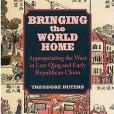《Huters》是University of Hawaii Press出版的圖書,作者是Theodore Huters
基本介紹
- 書名:Huters
- 作者:Theodore Huters
- 出版社:University of Hawaii Press
- 出版時間:2005年1月1日
- 頁數:384 頁
- 裝幀:Hardcover
- ISBN:9780824828387
- 價格:USD 59.00
內容簡介
Nineteenth-century China was a paradoxical place. On the one hand, significant new voices were determined to undertake reforms that would enable the Qing empire to cope with the powerful West; on the other, the literate public was for the most part equally intent on preserving the old ways. Bringing the World Home sheds new light on China's vibrant cultural life between 1895 an...(展開全部) Nineteenth-century China was a paradoxical place. On the one hand, significant new voices were determined to undertake reforms that would enable the Qing empire to cope with the powerful West; on the other, the literate public was for the most part equally intent on preserving the old ways. Bringing the World Home sheds new light on China's vibrant cultural life between 1895 and 1919 - a crucial period that marks a watershed between the conservative old regime and the ostensibly iconoclastic New Culture of the 1920s. Although generally overlooked in the effort to understand modern Chinese history, the era has much to teach us about cultural accommodation and is characterized by its own unique intellectual life. This original and probing work traces the most significant strands of the new post-1895 discourse, concentrating on the anxieties inherent in a complicated process of cultural transformation. It focuses principally on how the need to accommodate the West was reflected in such landmark novels of the period as Wu Jianren's Strange Events Eyewitnessed in the Past Twenty Years and Zhu Shouju's Tides of the Huangpu, which began serial publication in Shanghai in 1916. The negative tone of these narratives contrasts sharply with the facile optimism that characterizes the many essays on the "New Novel" appearing in the popular press of the time. Neither iconoclasm nor the wholesale embrace of the new could square the contradicting intellectual demands imposed by the momentous alternatives presenting themselves. Bringing the World Home fruitfully bridges the intellec

